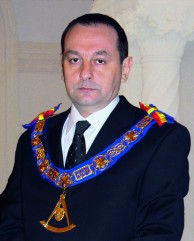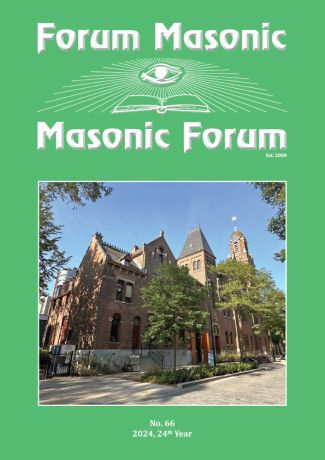EUGEN OVIDIU CHIROVICI
Past Grand Master, National Grand Lodge of Romania
Honorary Director, MASONIC FORUM Magazine
 I had only entered the Craft some five or six years when I had the opportunity to participate in a closed meeting with a foreign masonic personality, by reason of the MW Bro. Gheorghe Comănescu’s goodwill, Grand Master at that time.
I had only entered the Craft some five or six years when I had the opportunity to participate in a closed meeting with a foreign masonic personality, by reason of the MW Bro. Gheorghe Comănescu’s goodwill, Grand Master at that time.
The meeting was followed by a feast. The discussions were relaxed and they turned mostly on the motivations of those who knock – in Romania or elsewhere – at the gates of the Temple.
At some point, one of the Romanian brothers started speaking, who was an officer in our Grand Lodge at that time. He had received the light some four years previous.
He explained, for about fifteen minutes, to our guest what he thinks about Masonry, about its history and about the role the Craft should play in a contemporary society. He confessed that even in the first years after the fall of communism, he had the occasion to read several books on Freemasonry and he had felt incurably attracted to this philosophy and he had the certainty of an interior calling. He underlined that even before reception in the midst of a lodge – before, that is to say, being consecrated and recognized by the Brethren as a just and perfect member of the Order – he had considered himself a Mason, by his attitude to mankind and the set of moral and intellectual values which he fully shared. He closed happily, and blushing somewhat, by saying Freemasonry is his life.
The speech had gradually taken mellifluous hints which reminded me of the meetings of the Communist party (PCR) of previous days (I was not a PCR member, so my memories come from films, books and stories friends told on the subject). I told myself that the length of the speech – it had became a veritable speech – was out of all proportion (after all, we were there to learn, not teach) and its pathos would have been appreciated more had it come from a Brother whose Masonic experience was not so slim.
Finally, slightly tired, the man stopped talking and our guest asked whether he could answer. The Grand Master granted permission and this is what that man said:
He had been a member of the Craft for more than four decades and he had gone through almost all possible offices, except the office of Grand Master, being a person with an important career in his domain of activity, and having therefore a limited amount of time for extra-professional activities. He had traveled across the world as a representative of the Grand Lodge of which his Lodge was a part and he had met in his pilgrimages hundreds of Masonic personalities in tens of countries. What is Freemasonry? He did not have the pride to think he could offer a plausible answer, he confessed. Certainly, an answer that would not be formal and which would pass beyond a dictionary definition. He was over sixty years of age, but he hoped God would grant him enough years more to deepen the teachings and he hoped that before his time would come, he would understand at least some minuscule part of the spiritual thesaurus of Freemasonry.
I remember that after this answer, which did not take more than a minute or two, a rather embarrassed silence fell over the table. Talking to us about what he did not know, the man had said more than he could have said by a long speech on what he did know.
That is because it is a precondition of learning the acceptance of the fact that you do not know anything about the domain which you propose to study, by vocation or accident. I know it sounds easy, but easy things must sometimes be repeated, lest they be forgotten too easily.
P.S. I remembered the above one of these days, when, reading a comment posted on an article in the online edition of a daily, an anonymous person pretending to be a member of the NGLR was decrying the pitiful state of Romanian Freemasonry, a structure in which he and other “authentic intellectuals” feel embarrassed. Our intellectual spelled “nostri” (it means: our) with two “i”s.

















